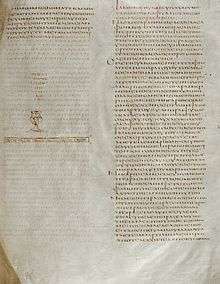Acts 28
Acts 28 is the twenty-eighth (and also the last) chapter of the Acts of the Apostles in the New Testament of the Christian Bible. It records the journey of Paul from Malta to Italy until finally settled in Rome. The book containing this chapter is anonymous, but early Christian tradition uniformly affirmed that Luke composed this book as well as the Gospel of Luke.[1]
| Acts 28 | |
|---|---|
Romans 1 → | |
.jpg) Acts 28:30-31 in Uncial 0166 (5th century). | |
| Book | Acts of the Apostles |
| Category | Church history |
| Christian Bible part | New Testament |
| Order in the Christian part | 5 |
Text
The original text was written in Koine Greek and is divided into 31 verses.
Textual witnesses
Some early manuscripts containing the text of this chapter are:
- Codex Vaticanus (AD 325–350)
- Codex Sinaiticus (330–360)
- Codex Bezae (~400)
- Codex Alexandrinus (400–440)
- Codex Ephraemi Rescriptus (~450; extant verses 1–4)
- Codex Laudianus (~550; extant verses 27–31)
Old Testament references
New Testament references
Location
This chapter mentions or alludes to the following places (in order of appearance):
Verse 6
- But they were expecting that he was going to swell up or suddenly drop dead. So after they had waited a long time and had seen nothing unusual happen to him, they changed their minds and said he was a god (theón)."[2]
From the Biblos Interlinear Bible:[3]
hoi de prosedokōn auton mellein pimprasthai ē katapiptein aphnō nekron οἱ δὲ προσεδόκων αὐτὸν μέλλειν πίμπρασθαι ἢ καταπίπτειν ἄφνω νεκρόν - but they were expecting him to be going to become inflamed or to fall down suddenly dead epi poly de autōn prosdokōntōn kai theōrountōn mēden atopon eis auton ginomenon ἐπὶ πολὺ δὲ αὐτῶν προσδοκώντων καὶ θεωρούντων μηδὲν ἄτοπον εἰς αὐτὸν γινόμενον after a while great however they expecting and seeing nothing amiss to him happening metabalomenoi elegon auton einai theon μεταβαλόμενοι ἔλεγον αὐτὸν εἶναι θεόν having changed their opinion said he was a god
For comparison, see John 1:1
Verse 8
The Pulpit Commentary noted that "the terms here used are all professional ones. Greek: Πυρετός, in the plural, is of frequent occurrence in Hippocrates, Aretaeus, and Galen, but elsewhere in the New Testament always in the singular; Greek: δυσεντερία, only found here in the New Testament, is the regular technical word for a "dysentery," and is frequently in medical writers coupled with Greek: πυρετοί or πυρετός, as indicating different stages of the same illness.[4]
The Ethiopic version of Acts adds after "Paul went in to him and prayed", "and he entreated him to put his hand upon him" meaning either that Publius asked this favour of the apostle for his father, having heard of the affair of the viper, from whence he concluded there was something divine and extraordinary in him; or the father of Publius asked this for himself.[5]
Verse 31

The narrative of Acts ends with Paul:
- preaching the kingdom of God and teaching the things which concern the Lord Jesus Christ with all confidence, no one forbidding him.[6]
See also
- Twin Brothers (Dioskouroi)
- Paul the Apostle
- Related Bible parts: Acts 26, Acts 27
References
- Holman Illustrated Bible Handbook. Holman Bible Publishers, Nashville, Tennessee. 2012.
- Acts 28:6 NET
- http://interlinearbible.org/acts/28-6.htm
- Pulpit Commentary on Acts 28 http://biblehub.com/commentaries/pulpit/acts/28.htm accessed 21 October 2015
- Gill, J., Gill's Exposition of the Entire Bible on Acts 28 http://biblehub.com/commentaries/gill/acts/28.htm accessed 21 October 2015
- Acts 28:31 NKJV
External links
- Acts 28 King James Bible - Wikisource
- English Translation with Parallel Latin Vulgate
- Online Bible at GospelHall.org (ESV, KJV, Darby, American Standard Version, Bible in Basic English)
- Multiple bible versions at Bible Gateway (NKJV, NIV, NRSV etc.)
